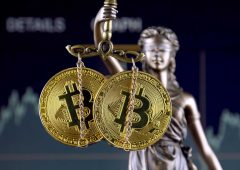Are Crypto Founders Resorting to Geofencing Due to U.S. Regulations?
01.10.2024 18:15 2 min. read Alexander Zdravkov
Amid escalating regulatory challenges in the U.S., many cryptocurrency founders are considering geofencing as a last-resort strategy for compliance.
Jake Chervinsky, chief legal officer at Variant Fund, highlighted this trend in a recent post, where he explained that geofencing involves restricting access to services based on a user’s geographical location.
By establishing a virtual barrier, companies can prevent users from regions with strict regulations—like the U.S.—from accessing their platforms. Chervinsky noted that while this may be a necessary step for some firms, it represents a significant withdrawal from the American market. He remarked, “This is a drastic measure, but sometimes it’s unavoidable.”
In 2023, 17 regions tightened their cryptocurrency regulations, impacting about 70% of global crypto activity, according to TRM Labs. Notably, some protocols, such as the rebranded Sky (formerly Maker), have faced backlash for blocking VPN access to comply with U.S. regulations. Binance also employs geofencing, notifying users from U.S. IP addresses that the site is unavailable.
Chervinsky’s guide suggests best practices for geofencing, including the use of IP and GPS data to identify users and employing multiple blocking techniques. He also advises reducing reliance on U.S.-based infrastructure to better navigate these regulatory waters. While geofencing can help companies enter new markets while maintaining compliance, it is ultimately seen as a costly and extreme tactic in the face of U.S. regulatory demands.
-
1
Binance Could Introduce Golden Visa Option for BNB Investors Inspired by TON
07.07.2025 8:00 1 min. read -
2
Weekly Recap: Key Shifts and Milestones Across the Crypto Ecosystem
06.07.2025 17:00 4 min. read -
3
Trump Imposes 50% Tariff on Brazil: Political Tensions and Censorship at the Center
10.07.2025 7:00 2 min. read -
4
Key Crypto Events to Watch in the Next Months
20.07.2025 22:00 2 min. read -
5
USA Imposes Tariffs on Multiple Countries: How the Crypto Market Could React
08.07.2025 8:30 2 min. read
Bitwise CIO: The Four-Year Crypto Cycle is Breaking Down
The classic four-year crypto market cycle—long driven by Bitcoin halvings and boom-bust investor behavior—is losing relevance, according to Bitwise CIO Matt Hougan.
Strategy to Raise Another $2.47 Billion for Bitcoin Acquisition
Strategy the company formerly known as MicroStrategy, has announced the pricing of a new $2.47 billion capital raise through its initial public offering of Variable Rate Series A Perpetual Stretch Preferred Stock (STRC).
AI Becomes Gen Z’s Secret Weapon for Crypto Trading
A new report from MEXC reveals a striking generational shift in crypto trading behavior: Gen Z traders are rapidly embracing AI tools as core components of their strategy.
3 key Reasons Behind Today’s Crypto Market Drop
The crypto market shed 1.02% in the past 24 hours, led by a sharp Bitcoin drop and fading altcoin interest.
-
1
Binance Could Introduce Golden Visa Option for BNB Investors Inspired by TON
07.07.2025 8:00 1 min. read -
2
Weekly Recap: Key Shifts and Milestones Across the Crypto Ecosystem
06.07.2025 17:00 4 min. read -
3
Trump Imposes 50% Tariff on Brazil: Political Tensions and Censorship at the Center
10.07.2025 7:00 2 min. read -
4
Key Crypto Events to Watch in the Next Months
20.07.2025 22:00 2 min. read -
5
USA Imposes Tariffs on Multiple Countries: How the Crypto Market Could React
08.07.2025 8:30 2 min. read


